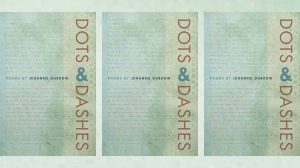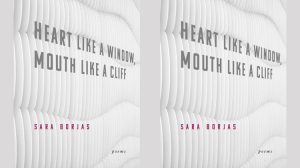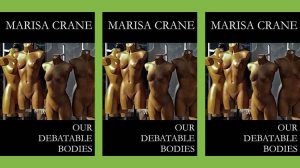Lizzie, Speak by Kailey Tedesco / White Stag Publishing / 2019 / 978-1732399235
Lizzie, Speak by Kailey Tedesco is a séance in the form of a book, a conjuring of the spirit of Lizzie Borden, famously believed to have murdered her father and stepmother with an axe in Fall River, Massachusetts in 1892. The form and formatting of these poems feels ritualistic, beginning with the titular poem which stands apart from the rest of the collection as an invocation. This poem calls upon Lizzie Borden, entreats her to share her story,
lizzie, fit your eyesinto my sockets
come, speakwhat you have done
 And so as readers we find ourselves between the pages of a séance with Kailey Tedesco as our guide, beckoning again to the spirit of Lizzie Borden, inviting her in: “Lizzie, Come Forth” is the title of the first part of the collection. As I turned the page, I imagined her with us — called by Tedesco’s words, and by my reading of them. I imagine all three of us sitting together in the room.
And so as readers we find ourselves between the pages of a séance with Kailey Tedesco as our guide, beckoning again to the spirit of Lizzie Borden, inviting her in: “Lizzie, Come Forth” is the title of the first part of the collection. As I turned the page, I imagined her with us — called by Tedesco’s words, and by my reading of them. I imagine all three of us sitting together in the room.
The poems here are pain-soaked and visceral. The poems weave from first person to third, and it grows more and more difficult to know when our medium is speaking or being spoken through. The veil between worlds begins to lift, our speaker possessed.
The poems in Lizzie, Speak use space and silence in a way that amplifies the haunting nature of this work. The blank spaces do not feel empty. Whether it is breath or spirit, there is something lingering in between words. Stars, marrow, blood, and ghosts are peppered throughout these poems, walking alongside death and the cosmic in a way that is incredibly personal and specific. The first part ends with a poem titled “Apport,” a term used to describe the sudden appearance of objects, thought to be offered up by the spirits during a séance. This poem is sensual and sexual and ends with a crowning, as if Borden has lain and labored psychically with Tedesco, giving birth to something new and unexpected.
In the second part Tedesco turns from conjurer to conspirator, asking “Lizzie, What Have We Done?” A direct response to the poem that preceded it, but this question also calls to mind the invitation from the first poem that set us upon this path. In “Lizzie/Lizbeth,” part two begins
a drowned infant returns
to me veiled in amniotic fluid —
and we meet this child caught between worlds,
she speaks to me
in the language of channeling
and then, harkening back to that image in the very first poem,
she gave me two glass eyes
irised with bloodstone
Offering up new ways of seeing and perhaps, one hopes, some answers. The question that lingers throughout this book is, of course, did she do it? While we speculate, our medium reaches into the spirit world again and again, whatever the risk. And there does seem to be some risk in all of this, though it is not clear if the danger stems from Lizzie Borden herself or the mere act of communing with the spirit world in such a way. In the poem “I Remain Unforgiven On This Side of the Veil,” the speaker shares their fear of the consequences of this ritual:
sleep will never come easily again
i will need to set
an altar in my airways
brandish sage with my teeth
But one also hears a possible lament from Lizzie in this poem, a recognition of her own horrors. What fascinates me about this collection is how entangled our guide and Lizzie Borden become. Even as poems explicitly try to separate them, like “I Ask The Nether World If Lizzie Did It,” (which provides no definitive answer for us, really, except that Lizzie herself is the answer) and more finally in the penultimate poem “In Which I Attempt To Exorcise Lizzie From Me” where the speaker reclaims their body, a parting that feels sorrowful and sure.
This poem feels like one of the most important poems in the entire collection, in a way, because of how it acknowledges the relationship between Kailey Tedesco and Lizzie Borden, but also because of what it accomplishes in the space. The stanzas move back and forth, almost rocking between worlds. When the speaker declares, “i find myself again” it feels like a true return, and the ritual ends. Or does it? The final poem is truly an expansion of that very line, of self-discovery and recognition…but is it Tedesco or Borden speaking? There is a relief when she says “i shake the shadow from me,” as if the weight of what has transpired between these pages has been lifted. We end as we began, with an invitation: to move beyond the spirit world, to meet her now in the corporeal world, an invitation so strange and wonderful:
now come
hear the meat inside of me
Kailey Tedesco has accomplished something masterful and ethereal in this haunting book.




Leave a Reply